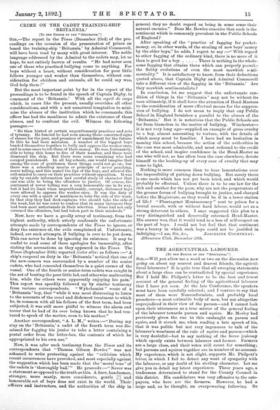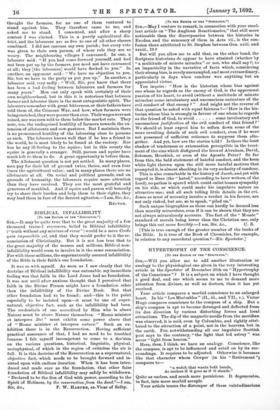THE AGRICULTURAL LABOURER.
LT0 THE EDITOR OF THE " SPECTATOR.")
SIR,—Will you allow me a word or two on the discussion now going on about my nearest and dearest friends, the agricul- tural labourers ? It is quite true that all sweeping statements about a large class can be contradicted by special experience. But I hold Mr. Philpott's letter to be the best and truest account of the general feeling of the agricultural labourer that I have yet seen. At the late Conference, the speakers must have been carefully selected ; and I venture to say that most of them were Nonconformists, and probably local preachers—a most estimable body of men, but not altogether unprejudiced in their view of the parson—and I cannot look upon their utterances as a true mirror of the general feeling of the labourer towards parson and squire. Mr. Morley had previously given the cue to this onslaught on parson and squire, and it struck me, when reading a late speech of his, that it was politic but not very ingenuous to talk of the labourer's weariness of the rule of squire and parson—which is very doubtful—but to say nothing of the fierce jealousy which openly exists between labourer and farmer. Farmers are a large class, and their votes still count for something; but parsons and squires together are in number of no account. My experience, which is not slight, supports Mr. Philpott's letter, in which I fail to detect any want of sympathy with the labourer, or any doubt of his sterling character. Let me give you in detail my latest experience. Three years ago, a tradesman determined to stand for the County Council in this district. His candidature was very offensive to the rate- payers, who here are the farmers. However, he had a large and, as he thought, an overpowering following. So thought the farmers, for no one of them ventured to stand against him. They therefore came to me, and asked me to stand. I consented, and after a sharp contest I was elected. This is a purely agricultural dis- trict, and the labourers are as five to one of all other classes combined. I did not canvass my own parish ; but every vote was given to their own parson, of whose rule they are so weary. The neighbouring villages I canvassed. In one, a labourer said : " If you had come forward yourself, and had not been put up by the farmers, you need not have canvassed at all; they [the labourers] would have flocked to you." In another, an opponent said : " We have no objection to you, Sir, but we have to the party as put you up." In another, a labourer said, very sadly : " Well, Sir, you know that there has been a bad feeling between labourers and farmers for many years." Men can only speak with certainty of their own neighbourhood, but in this it is notorious that between farmer and labourer there is the most antagonistic spirit. The labourers remember with great bitterness, or their fathers have told them of, the Crimean War, and how, when farmers were being enriched, they were poorer than ever. Their wages were not raised, nor was corn sold to them below the market rate. They note, too, the undisguised hostility of farmers towards the ex- tension of allotments and cow-pastures. But I maintain there is no pronounced hostility of the labouring class to parsons as such. The labourer knows well that if he has a friend in the world, he is most likely to be found at the rectory. Nor has he any ill-feeling to the squire ; but in this county the squire is generally a stranger. Still, parson and squire have much left to them to do. A great opportunity is before them.
The Allotment question is not yet settled. In many places, men pay for their bit of ground twice, thrice, and even four times the agricultural value ; and in many places there are no allotments at all. On social and political grounds, and on grounds of humanity, the labourers require more attention than they have received. They are the most grateful and generous of mankind. And if squire and parson will honestly try to share their burden and help them to their rights, they may lead them in face of the fiercest agitation.—I am, Sir, &c., RECTOR.















































 Previous page
Previous page